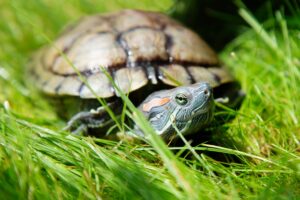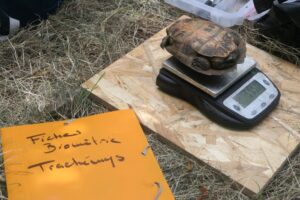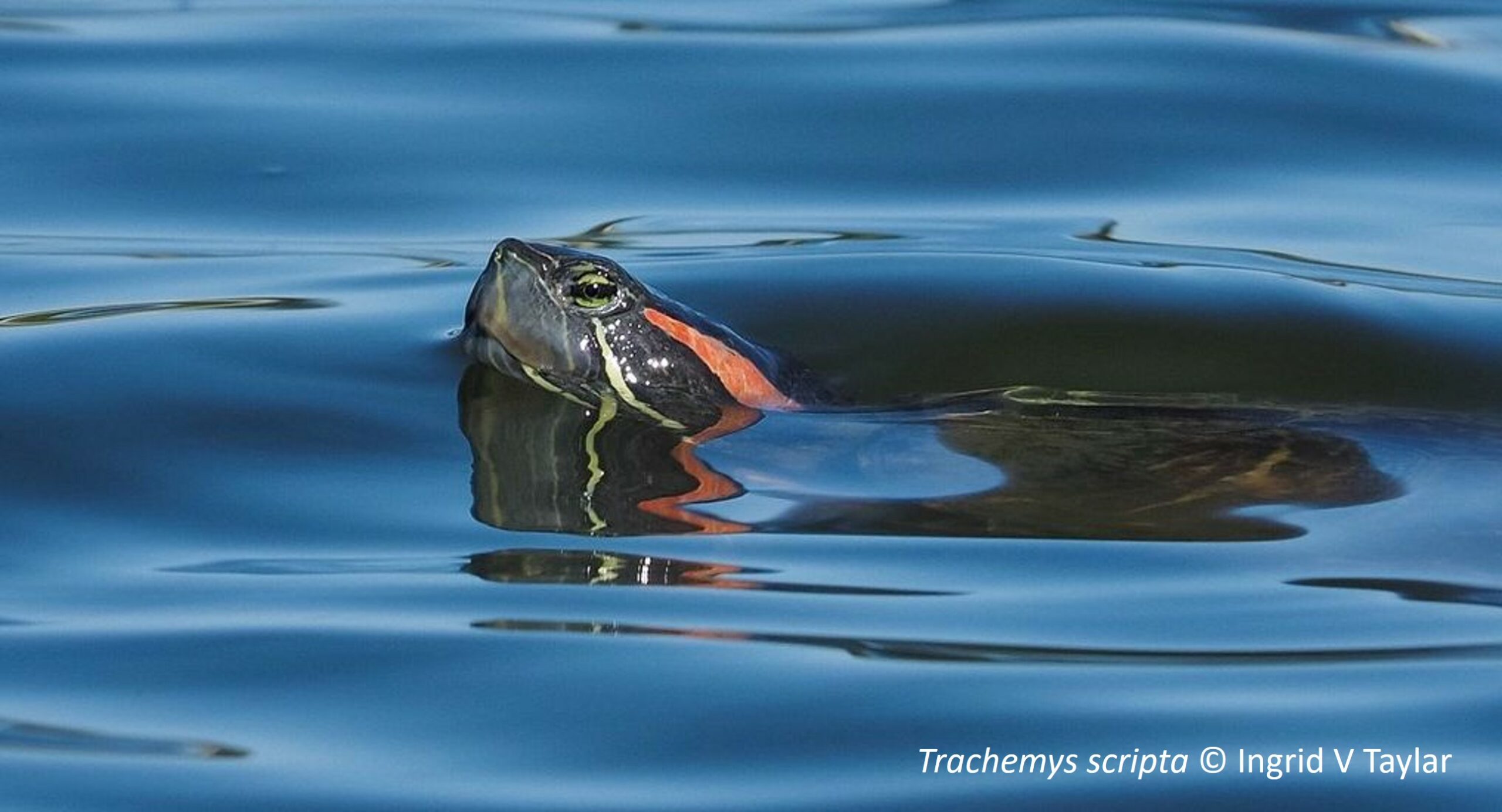While Guadeloupe and Martinique are home to a rich biodiversity, the presence of invasive alien species represents a serious threat to these fragile species. In this context, Caribaea Initiative just started a new program to better understand the demography and impact of exotic turtles in Guadeloupe and Martinique.
This new program, named DEVIMTOR (French acronym for demography and evaluation of the impact of invasive alien aquatic turtles in the French West Indies), builds on recent research carried out by the association in Guadeloupe as part of the MERCI project, a previous ambitious project dedicated to invasive alien reptiles in the French West Indies. Exotic freshwater turtles were indeed among the species studied, and the results obtained in Guadeloupe confirm both the importance of their presence on the island, and therefore the threat they pose to ecosystems, but also the need for further research (more information).

Trachemys scripta
The DEVIMTOR program is also particularly timely. In September, the IPBES (an intergovernmental panel on biodiversity) released its latest report dedicated to invasive alien species and to the considerable threat that they represent for global biodiversity (more information). This is particularly worrying for island environments, which are more vulnerable to these intruders. The study of these species is essential to better understand their impact and define targeted, effective action plans. Thus, the in-depth study of invasive turtle species in Guadeloupe and Martinique represents a crucial step towards protecting the unique biodiversity of these regions.
Three non-native freshwater turtle species have been identified in these two territories: the African slider (Pelusios castaneus), native to Africa, the Antillean slider (Trachemys stejnegeri), native to Puerto Rico, and the Yellow-bellied slider turtle (Trachemys scripta), originating from the United States of America and Mexico and listed among the 100 most invasive species in the world. Although these species appear harmless, they can have a significant impact on ecosystems, notably through their diet (competition, predation) and the introduction of pathogens they carry. Despite these risks, few studies have been carried out in Guadeloupe and Martinique.
The project will focus on three specific lines of research, based on modern study techniques. The environmental DNA approach will be developed and evaluated on both territories. This technique is used to detect the presence of target species through genetic analysis of environmental samples (water, sediments, etc.). It will thus be possible to assess the occurrence and relative abundance of several turtle species, even in environments where individuals are rare and therefore difficult to observe.

Weighing of an exotic turtle
Genetic analyses will also be used to better understand the diet of the three species. Stomach contents and faeces samples will be analyzed using a metabarcoding approach, a method that can identify a wide variety of organisms consumed by turtles. This method was tested during the MERCI project and adapted to the analysis of the stomach contents of freshwater turtle. Deployed on a large scale during this new project, it will also enable to establish the link between turtle diet and various ecological and physico-chemical parameters of water ponds. The same technique might also be used to identify certain pathogens from blood or liver samples, enabling the sanitary impact of turtles, particularly on human health, to be clarified.
The final part of the project will combine population genetics and telemetry techniques to better understand the demographic fluctuations of the three species, responsible for their spatial expansion and colonization of new environments. Biological samples will be collected and analyzed to understand gene flows between different populations in Guadeloupe and Martinique, while the movements of individuals fitted with GPS tags will be tracked for two years.
The DEVIMTOR project is funded by the Office français de la biodiversité (OFB) among other Research-Action projects on Invasive Alien Species. It is also co-financed by the Office de l’Eau de Martinique and the Office de l’Eau de Guadeloupe. In addition to the association Caribaea Initiative, the project will involve several partners (more information on the project webpage). Started in January 2024, this project that will also provide practical training for Caribbean students is scheduled to last three years.
Co-funded by the Office français de la biodiversité, the Office de l’Eau de Martinique and the Office de l’Eau de Guadeloupe


